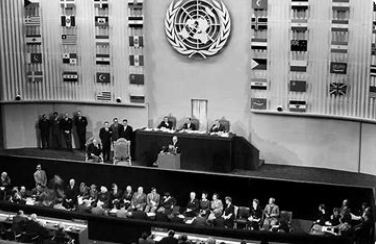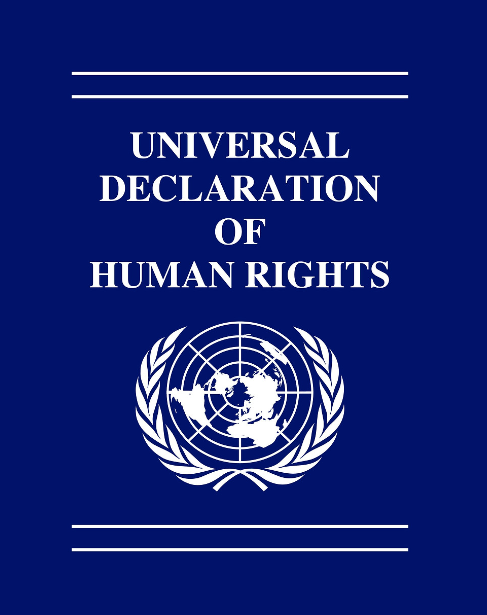Introduction
The United Nations General Assembly adopted the Universal Declaration of Human Rights (UDHR) on December 10, 1948. It is a significant document in the development of human rights, outlining essential human rights that should be universally safeguarded.
The Universal Declaration of Human Rights (UDHR) establishes the context for the subsequent articles by emphasising the fundamental importance of the intrinsic worth and equal rights that are inalienable of every individual in the human community. These principles serve as the basis for the promotion of justice, peace, and liberty worldwide. This statement recognises the cruel and savage actions that deeply offended the moral principles of mankind during World War II also emphasises the significance of safeguarding human rights by upholding the principles of legal governance.
Overview of Articles

Article 1:
Affirms that every individual is inherently free and possesses equal worth and entitlements from birth. Individuals have the capacity for rational thinking and moral judgement and should interact with each other in a spirit of unity and fraternity.
Article 2:
the declaration stipulates that all individuals are entitled to the full range of rights and freedoms outlined therein, without any form of discrimination based on factors such as race, colour, sex, language, religion, political or other opinion, national or social origin, property, birth, or any other status.
Article 3:
The declaration affirms the fundamental entitlement to life, freedom, and protection of individuals.
Article 4:
The document explicitly forbids the practice of slavery and servitude in any and all manifestations.
Article 5:
The document prohibits the act of torture and any form of treatment or punishment that is cruel, inhuman, or degrading.
Article 6:
Acknowledges the universal right of every individual to be recognised as a legal person in all places.
Article 7:
Explicitly declares the principle of legal equality and the right to equal protection under the law, without any form of discrimination.
Article 8:
Guarantees individuals the right to seek redress from competent national courts for any violations of their fundamental rights as established by the constitution or law.
Article 9:
The document prohibits the act of making arrests, detaining individuals, or forcing them into exile without any valid reason or justification.
Article 10:
Guarantees individuals the right to a just and open trial conducted by a neutral and unbiased court when determining their rights and responsibilities, as well as in any criminal proceedings.
Article 11:
Guarantees the presumption of innocence until proven guilty and safeguards the right to a trial that is open to the public.
Article 12:
The Universal Declaration of Human Rights safeguards individuals from unwarranted intrusion into their personal lives, including privacy, family, home, and communication, as well as from any harm to their reputation or honour.
Article 13:
Ensures the entitlement to unrestricted movement and habitation within the territorial boundaries of each nation, as well as the freedom to depart from any country, including one’s own, and to return to one’s homeland.
Article 14:
The Universal Declaration of Human Rights guarantees individuals the right to request protection from persecution by seeking asylum in foreign countries.
Article 15:
Acknowledges the entitlement to citizenship and the freedom to alter one’s citizenship.
Article 16:
Guarantees individuals the right to marry and establish a family. It also ensures that all individuals have equal rights in relation to marriage, both during the marriage and in the event of its dissolution.
Article 17:
Guarantees individuals the right to marry and establish a family. It also ensures that all individuals have equal rights in relation to marriage, both during the marriage and in the event of its dissolution.
Article 18:
The document ensures the protection of individuals’ rights to freely hold and express their thoughts, beliefs, and religious practices.
Article 19:
Guarantees individuals the right to freely express their opinions and thoughts.
Article 20:
Safeguards the entitlement to engage in peaceful gatherings and form associations.
Article 21:
Guarantees individuals the right to participate in the governance of their country, either directly or by selecting representatives of their choice. It also ensures that everyone has equal opportunities to access public service.
Article 22:
Acknowledges the entitlement to social security and the essential economic, social, and cultural rights necessary for maintaining dignity and enabling the unrestricted growth of an individual’s character.
Article 23:
Guarantees the entitlement to employment, the freedom to choose one’s occupation, fair and favourable working conditions, and safeguards against unemployment.
Article 24:
The legislation guarantees individuals the right to rest and leisure, which includes the fair restriction of working hours and regular paid holidays.
Article 25:
Acknowledges the entitlement to a satisfactory level of living, encompassing provisions such as nourishment, attire, shelter, medical assistance, and essential social services. It also recognises the right to protection in case of unemployment, illness, disability, widowhood, advanced age, or other forms of destitution.
Article 25:
Guarantees the entitlement to education, which must be provided without charge, particularly in the primary and fundamental levels. Furthermore, education should aim to foster the complete growth of the individual’s character.
Article 26:
Guarantees the entitlement to education, which must be provided without charge, particularly in the primary and fundamental levels. Furthermore, education should aim to foster the complete growth of the individual’s character.
Article 27:
Asserts the entitlement to unrestricted engagement in the cultural activities of the community, the enjoyment of artistic endeavours, and the participation in scientific progress and its advantages.
Article 28:
Stipulates that every individual has the right to a social and international system that allows for the complete realisation of the rights and freedoms outlined in the declaration.
Article 29:
States that individuals have obligations to the community and that while exercising their rights and freedoms, they must adhere to legal limitations that are solely aimed at ensuring the proper acknowledgment and respect for the rights and freedoms of others.
Article 30:
States that the declaration does not imply any right for any state, group, or individual to engage in activities that aim to destroy any of the rights and freedoms mentioned in the declaration.
Significance and Importance of the UDHR
The UDHR has served as the foundation for an expanding system of international human rights protection that includes legally binding treaties, such as the International Covenant on Civil and Political Rights (ICCPR) and the International Covenant on Economic, Social and Cultural Rights (ICESCR). It has influenced numerous national constitutions and laws and has been invoked by human rights activists worldwide.
References
The United Nations was established in 1948. The Universal Declaration of Human Rights. Obtained from the official website of the United Nations
Morsink, J. (1999). The topic of discussion is the origins, drafting process, and intended purpose of the Universal Declaration of Human Rights. The publisher is the University of Pennsylvania Press.
Glendon, M. A. (2001). A World Made New: Eleanor Roosevelt and the Universal Declaration of Human Rights. Random House.
The Universal Declaration of Human Rights (UDHR) continues to be a crucial instrument for safeguarding and advancing human rights on a global scale, encapsulating the universal desires for liberty, fairness, and parity.
